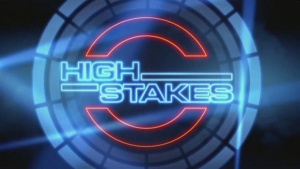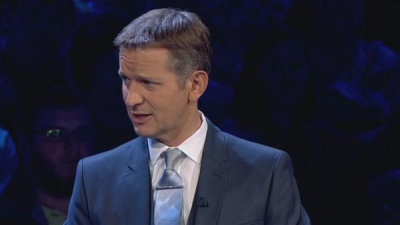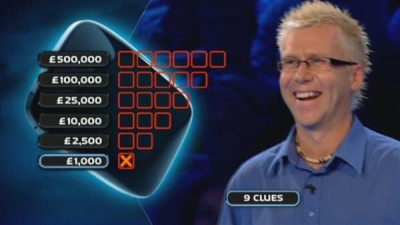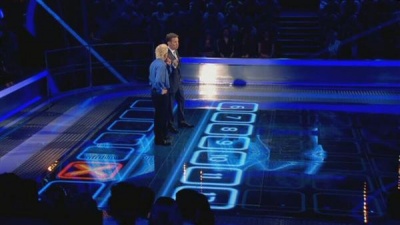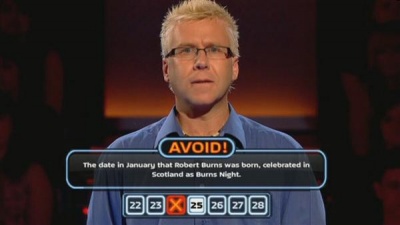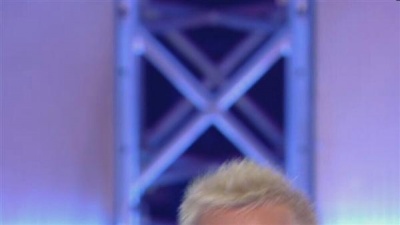High Stakes
(ft) |
|||
| Line 20: | Line 20: | ||
"This is High Stakes - the show where you need brains, bravery and just a little luck to win big money. But beware - one wrong step and you are down and out, instantly! On High Stakes, there is only one man who can help you..." and, sadly, that man is Jeremy Kyle. | "This is High Stakes - the show where you need brains, bravery and just a little luck to win big money. But beware - one wrong step and you are down and out, instantly! On High Stakes, there is only one man who can help you..." and, sadly, that man is Jeremy Kyle. | ||
| + | |||
| + | <div class=image>[[File:High stakes jeremy kyle.jpg|400px]]''Jeremy Kyle debating whether he should shout or not.''</div> | ||
The premise of this show is as follows: one contestant could win as much as £500,000 by placing themselves on numbers which they believe to be unlucky and/or incorrect. When he's not mocking their accents or just being generally obnoxious, Kyle is actually there to help them. It's worth noting that the host has no idea what the clues are, no idea where the traps are set and no idea how to act like a genuine human being rather than a shouty caricature. | The premise of this show is as follows: one contestant could win as much as £500,000 by placing themselves on numbers which they believe to be unlucky and/or incorrect. When he's not mocking their accents or just being generally obnoxious, Kyle is actually there to help them. It's worth noting that the host has no idea what the clues are, no idea where the traps are set and no idea how to act like a genuine human being rather than a shouty caricature. | ||
| + | |||
| + | <div class=image>[[File:High stakes scorecard.jpg|400px]]''£1,000 won so far, will the lie dete--oh wait, wrong show.''</div> | ||
The main feature of the set is the LED display floor which displays six rows of seven squares, each with a chain of consecutive numbers (e.g. 6-12). Each contestant emerges from the underground bunker where his/her supporters remain throughout and joins Kyle on stage. They are given 10 clues which they can use at any time to help them on their way or - if they're brave enough - they can trust their own instincts and take risks though, for reasons that will shortly be addressed, it's more sensible to take the clues! | The main feature of the set is the LED display floor which displays six rows of seven squares, each with a chain of consecutive numbers (e.g. 6-12). Each contestant emerges from the underground bunker where his/her supporters remain throughout and joins Kyle on stage. They are given 10 clues which they can use at any time to help them on their way or - if they're brave enough - they can trust their own instincts and take risks though, for reasons that will shortly be addressed, it's more sensible to take the clues! | ||
| + | |||
| + | <div class=image>[[File:High stakes grid.jpg|400px|High Stakes]]''Jeremy trying to figure out if these numbers correspond to the contestant's D.N.A. test.''</div> | ||
Row 1 is worth £1,000 and is fitted with one trap out of seven. The contestant must either pick a number off their own back which they believe to be safe or be given a hint as to which square to avoid by the disembodied voice of Elizabeth Conboy. The clue will require the contestant and Kyle to work out which square the clue refers to - for example, in the video seen below, the first clue asked the contestant to avoid 'The year in which Harry Potter and The Philosopher's Stone was first published in the UK' and the numbers were [19]92-[19]98. The contestant must then stand on any of the numbers they believe to be incorrect. Once they are happy - sorry, ''committed'' - the location of the trap is then revealed. Provided they have avoided it, they stay in the game. If not, the game is over and the floor sinks, swallowing the contestant. | Row 1 is worth £1,000 and is fitted with one trap out of seven. The contestant must either pick a number off their own back which they believe to be safe or be given a hint as to which square to avoid by the disembodied voice of Elizabeth Conboy. The clue will require the contestant and Kyle to work out which square the clue refers to - for example, in the video seen below, the first clue asked the contestant to avoid 'The year in which Harry Potter and The Philosopher's Stone was first published in the UK' and the numbers were [19]92-[19]98. The contestant must then stand on any of the numbers they believe to be incorrect. Once they are happy - sorry, ''committed'' - the location of the trap is then revealed. Provided they have avoided it, they stay in the game. If not, the game is over and the floor sinks, swallowing the contestant. | ||
| + | |||
| + | <div class=image>[[File:High stakes burns night.jpg|400px]]''The number 25 is lit, is that the wrong answer?''</div> | ||
In the event that the player is successful, Jeremy offers them the chance to cut and run with their winnings or they can decide to play on. However, on each row the number of traps increases with two on row 2, three on the third row etc. However, by way of compensation, the money sharply increases too: row 2 is worth £5,000, row 3 is worth £10,000, row 4 offers £25,000 with £100,000 up for grabs on row 5 before the jackpot of £500,000 for the brave souls (read nobody) who tackle row 6. | In the event that the player is successful, Jeremy offers them the chance to cut and run with their winnings or they can decide to play on. However, on each row the number of traps increases with two on row 2, three on the third row etc. However, by way of compensation, the money sharply increases too: row 2 is worth £5,000, row 3 is worth £10,000, row 4 offers £25,000 with £100,000 up for grabs on row 5 before the jackpot of £500,000 for the brave souls (read nobody) who tackle row 6. | ||
| + | |||
| + | <div class=image>[[File:High stakes sinking feeling.jpg|400px|High Stakes]]''Nope. It was right and Jeremy tells the contestant to "Do One".''</div> | ||
Can you see the problem here? With 10 clues at their disposal and a total of 10 traps to avoid on rows 1-4, who in their right mind is going to rely on blind luck when they can be told where NOT to stand and use logic to fill in the gaps? It doesn't make for the most unpredictable of circumstances and who can blame them for following this strategy? It's safe to say the format has holes the size of solar systems in it and ITV must've agreed - shoving it out at 8pm on a Tuesday evening, it never stood a chance. | Can you see the problem here? With 10 clues at their disposal and a total of 10 traps to avoid on rows 1-4, who in their right mind is going to rely on blind luck when they can be told where NOT to stand and use logic to fill in the gaps? It doesn't make for the most unpredictable of circumstances and who can blame them for following this strategy? It's safe to say the format has holes the size of solar systems in it and ITV must've agreed - shoving it out at 8pm on a Tuesday evening, it never stood a chance. | ||
Revision as of 23:13, 4 June 2023
Contents |
Host
Jeremy Kyle
Co-hosts
Voiceovers: Elizabeth Conboy and Marc Silk
Broadcast
ITV Studios in association with Escalate Television for ITV1, 11 October to 13 December 2011 (8 episodes in 1 series)
Synopsis
"This is High Stakes - the show where you need brains, bravery and just a little luck to win big money. But beware - one wrong step and you are down and out, instantly! On High Stakes, there is only one man who can help you..." and, sadly, that man is Jeremy Kyle.
The premise of this show is as follows: one contestant could win as much as £500,000 by placing themselves on numbers which they believe to be unlucky and/or incorrect. When he's not mocking their accents or just being generally obnoxious, Kyle is actually there to help them. It's worth noting that the host has no idea what the clues are, no idea where the traps are set and no idea how to act like a genuine human being rather than a shouty caricature.
The main feature of the set is the LED display floor which displays six rows of seven squares, each with a chain of consecutive numbers (e.g. 6-12). Each contestant emerges from the underground bunker where his/her supporters remain throughout and joins Kyle on stage. They are given 10 clues which they can use at any time to help them on their way or - if they're brave enough - they can trust their own instincts and take risks though, for reasons that will shortly be addressed, it's more sensible to take the clues!
Row 1 is worth £1,000 and is fitted with one trap out of seven. The contestant must either pick a number off their own back which they believe to be safe or be given a hint as to which square to avoid by the disembodied voice of Elizabeth Conboy. The clue will require the contestant and Kyle to work out which square the clue refers to - for example, in the video seen below, the first clue asked the contestant to avoid 'The year in which Harry Potter and The Philosopher's Stone was first published in the UK' and the numbers were [19]92-[19]98. The contestant must then stand on any of the numbers they believe to be incorrect. Once they are happy - sorry, committed - the location of the trap is then revealed. Provided they have avoided it, they stay in the game. If not, the game is over and the floor sinks, swallowing the contestant.
In the event that the player is successful, Jeremy offers them the chance to cut and run with their winnings or they can decide to play on. However, on each row the number of traps increases with two on row 2, three on the third row etc. However, by way of compensation, the money sharply increases too: row 2 is worth £5,000, row 3 is worth £10,000, row 4 offers £25,000 with £100,000 up for grabs on row 5 before the jackpot of £500,000 for the brave souls (read nobody) who tackle row 6.
Can you see the problem here? With 10 clues at their disposal and a total of 10 traps to avoid on rows 1-4, who in their right mind is going to rely on blind luck when they can be told where NOT to stand and use logic to fill in the gaps? It doesn't make for the most unpredictable of circumstances and who can blame them for following this strategy? It's safe to say the format has holes the size of solar systems in it and ITV must've agreed - shoving it out at 8pm on a Tuesday evening, it never stood a chance.
Still, on the bright side, that nifty LED floor, eh?
Catchphrases
"Committed to (whatever number)"
Inventor
Format devised by Escalate Television.
Theme music
MCASSO
Trivia
Originally commissioned as a lead-in to The X Factor, High Stakes was found less than suitable for this high-profile slot. It was shown at 8pm on Tuesday evenings, a part of the schedule where ITV had trouble beating the test card. Viewers in Northern Ireland saw High Stakes after 11pm, the tourist programme Lesser Spotted Ulster went out in prime-time instead.
Web links
See also
Videos
The very first episode.

